The need for community actualisation is equivalent to the financial Layer 8. The COVID-19 pandemic offers a path to alternatives to capitalism: ecofeminism, degrowth, unions, and the circular economy. Caring and maintenance are resistant to paradigms of unlimited growth and disruptive innovation.
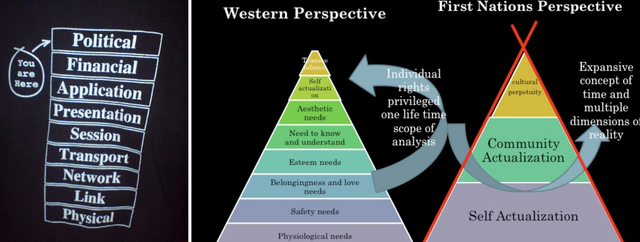
The extended versions of the OSI networking model and Maslow’s pyramid have additional layers. When discussing RIPE Community resilience, I consider Layer 8 to be:
- The Financial Layer, as defined by Evi Nemeth, and
- The need for community actualisation, as seen from The First Nations perspective.
While “the Internet” started as an academic, not-for-profit project (the story about its military origins is a topic for another time), it has quickly become commercial, and now it is an integral part of the globalised, neo-liberal economy. Technical workers are still workers, and their labour was both celebrated and exploited during the pandemic; classical and alternative economies have "the Internet" as fertile soil for experimentation; and caring for our health, each other, for communities, and for the planet is priceless - as in, it cannot be accounted for by financial instruments only.
That's why I see Layer 8 as a need for contributing, sharing, and practising participatory altruism.
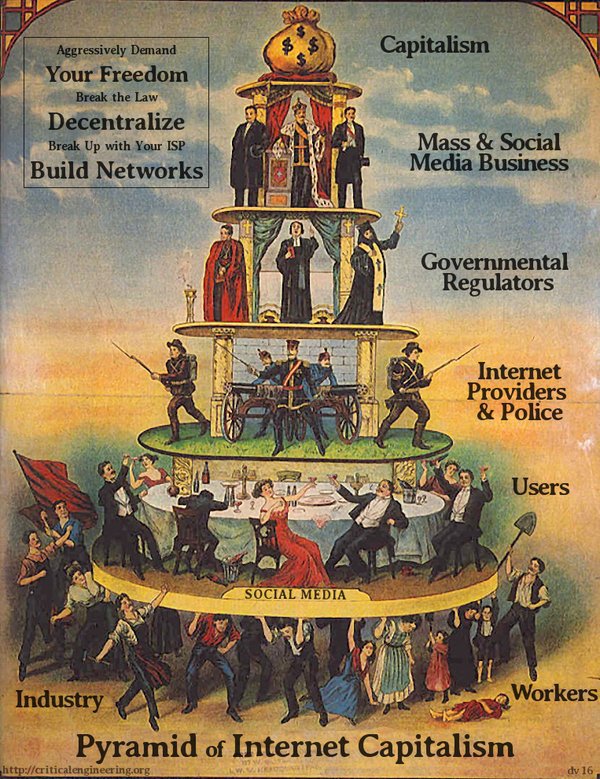
Technical Is Financial
People in technical communities — engineers, programmers, designers, hackers — are passionate about tech: we use it to be educated or distracted, to help us with physical disabilities, to make friends. But on some level, we also work in tech because we are getting paid: to “earn a living”, to make money (sometimes literally, with digital coins), and to “get a job”.
Here is some financial and career advice from fellow techies:
- "Fantastic People and Where to Find Them: Making Layers 8 & 9 Work for You", by Julia Freeman at NLNOG 2019 (video, PDF)
- "The Economics of Open Source", by C J Silverio | JSConf EU 2019 (transcript & video)
- "Career Development & Money", by Bert Hubert at NLNOG 2020 (video)
And here’s an alternative view on the digital economy by academics, artists, and philosophers: "MoneyLab Reader: An Intervention in Digital Economy" (2015), Institute of Network Cultures.

Remote Workers of the World, Unite: During the Pandemic!
Even before the COVID-19 pandemic, many techies were already “telecommuting”/“working remotely”. However, in February 2020, the Internet became an “essential service”, with everyone’s economic and health activities dependent on “being online”. Most technical workers had both the duty to keep the internet up and the privilege to “work from home”. For some, "lockdown" was helpful in balancing home care and employment expectations; for others, it brought a sharper focus on existing inequalities.
At the start of the crisis, several voices pointed out the opportunities to make lasting changes:
- "After the Pandemic, We Can’t Go Back to Sleep", by David Graeber
- "The Catalyst Effect of COVID-19", by Heather Marsh
- "We have never in the history of humanity had an opportunity like we do now to be free of endosocial extremism."
- "The Lockdown in our Minds will be the Last Restriction to be Lifted", by Rafael Behr
- "Repairing the damage done by this disease will be a project of cultural reconnection, not just economic redistribution. We will need new ways to feel joined for as long as we cannot take each other by the hand."
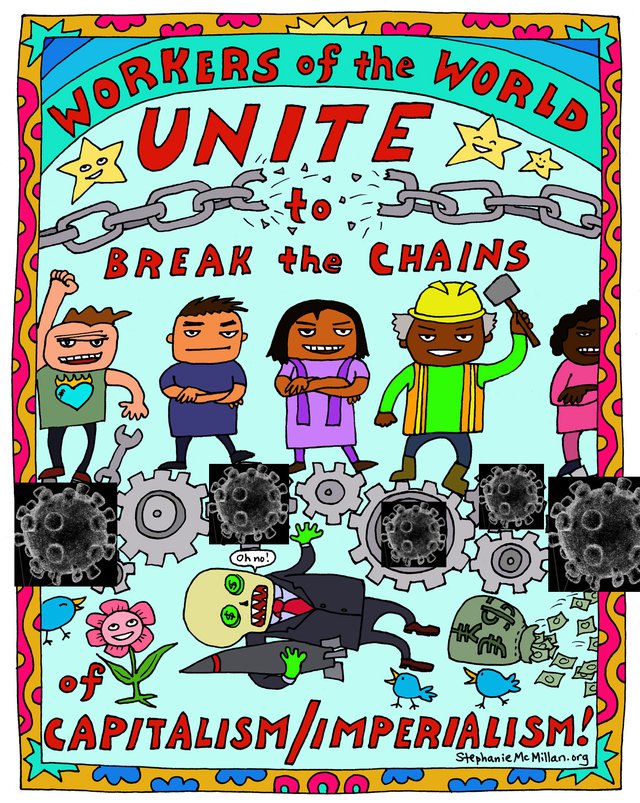
A year and a half into the pandemic, analyses of the labour relationships of remote work and of the impact locally on our health as well as globally on the economy have been plentiful. Here are just a few conclusions:
- “People’s Health and Rights – and not Intellectual Property and Profit – should be at the Centre of Responses to the COVID-19 Crisis" (Joint Civil Society Statement, APC, June 2021)
- "Winners and Losers: The Global Economy After COVID" (June 2021)
- "How Covid-19 Accelerated the Corporate Takeover of Our Economy" (July 2021)
- Despite early predictions that the pandemic would be a 'great leveller,' it's increasingly clear that Covid-19 has helped major corporations increase their power – and only worker organising can fight back.
- “A Wave of Resignations” or “The Great Resignation” is happening in July 2021
- "Remote Working, Management Control Changes and Employee Responses during the COVID-19 Crisis" (paper, April 2021)
- "A strong motivation to engage in extra work and a fear of being overlooked [while remote working] has the potential to turn into over commitment and self-exploitation, which could subsequently lead to higher levels of stress or even burnouts."
- "Feminist Economic Perspectives on the COVID-19 Pandemic", paper by Naila Kabeer, Shahra Razavi, and Yana van der Meulen Rodgers (March 2021)

“It’s the Economy, Stupid!”
Since the “Declaration of the Independence of Cyberspace”, techno-utopians have believed that the Internet could help “digital citizens” escape the destiny predicted by “historical materialism”: that is, becoming part of the dominant economic and socio-political system.
"The internet’s distinct architecture arose from a distinct constraint and a distinct freedom: First, its academically minded designers didn’t have or expect to raise massive amounts of capital to build the network; and second, they didn’t want or expect to make money from their invention. -- Jonathan Zittrain, June 2021
However, a quarter of a century later, we can conclude that capitalism has won: "the Internet” has adjusted itself to the major paradigm of our time, rather than changing the world. This paradigm "concentrates power in the hands of a minority capitalist class that exists through the exploitation of the majority working class and their labor; prioritizes profit over social good, natural resources and the environment; is an engine of inequality, corruption and economic instabilities; and...many are not able to access its purported benefits and freedoms.” (Wikipedia)
Researchers and academics have been pointing out the dangers of monopoly consolidation, the digital divide, and labour exploitation for a long time:
- "The Internet's Gilded Age" , by Geoff Huston (March 2017)
- "Rosa Luxemburg’s Internet? For a Political Economy of State Mobilization and the Movement of Accumulation in Cyberspace", by Dan Schiller (2014)
- "Democratizing the Network Edge" (Jennifer Rexford et al.) ACM SIGCOMM Computer Communication Review (2019)
- "With consolidation on all layers, the problem shifts from technology to political economy." (Niels Ten Over)
- ... and many more links
And, of course, the interplay of economic crisis and pandemic brings the underlying issues in sharper focus:
- "The Financialisation of Big Tech: Engineering Digital Monopolies", by Rodrigo Fernandez & Ilke Adriaans (December 2020)
- "Future Schlock: Utopia can be Found in Rejection of the Utopian Dreams of Tech Companies", by Jathan Sadowski (January 2021)
- "Poor in Tech", by Meg Elison (May 2021)
- "Digital Colonialism: The Evolution of US Empire", by Michael Kwet (March 2021)
I do believe that utopia is possible! As a counterbalance to the the financialisation of the Internet, let’s look at possible alternatives:
“Feminist Economics: A form of economics that has no relation to money, but that organizes home on the planet around the production of health and life. “http://feministeconomicsdepartment.com/
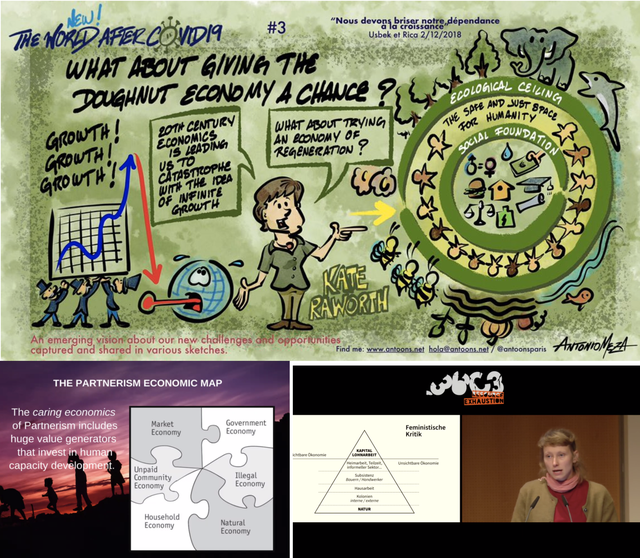
(Do Not) Follow the Money
In the early days of the the RIPE Community (and other technical communities), we realised that the principles of free-markets, profits, and competition are not sufficient for governing the resources that form the underlying infrastructure of the Internet. We have used consensus building for making decisions and used the rules for stewardship of the commons as policies for the distribution of IP resources, even if those policies have not explicitly referred to “commons”.
One of my heroines, Elinor Ostrom, described these practices in her 1990 book “Governing the Commons”, and in 2009, she was awarded the Nobel Prize in Economic Sciences (lecture) for that work.
To address the many issues plaguing mainstream capitalism, plenty of alternative economic theories have sprung up. My favourites are those by feminist economists. Here is a quotation from the recent APC Feminist Internet research report that makes a point about the intersectionalities between the economy and the role of the Internet as they are “focusing on the dynamics of power and structural inequalities… in relation to four identified areas – access, online gender-based violence, datafication/artificial intelligence, and labour and the economy – recognising that often these are not separate areas of research but are interconnected.”
My Top 10 21st-Century Alternative Economic Theory Books:
- Giving Economy, Heather Marsh (in “Binding Chaos”, 2013)
- Post-carbon Economy, Naomi Klein (in “On Fire”, 2021)
- Caring Economy, Riane Eisler (2007) : http://caringeconomy.org/
- Decolonising Economics, Nonhlanhla Makuyana (2021) https://decolonisingeconomics.org/
- Ecofeminism, Maria Mies and Vandana Shiva (2014) https://www.environmentandurbanization.org/ecofeminism
- Mutualism, Sara Horowitz (2021)
- Doughnut Economics, Kate Raworth (2017 ) https://doughnuteconomics.org/
- Mission Economy, Mariana Mazzucato (2021)
- The Support Economy: Shoshana Zuboff (2002) http://www.thesupporteconomy.com/
- Enlightenment Economics, Diane Coyle (in “The Economics of Enough”, 2011)
What all of these have in common is criticism of neoliberal capitalism and a focus on sustainability, care, equity, and co-empowerment.
There is much more material about alternative economies that I have collected; you can find it in the “Further Resources” section.
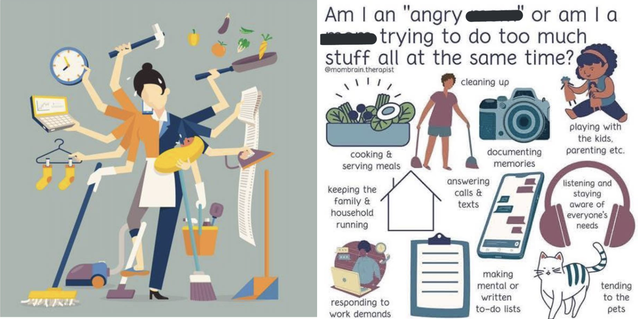
Caring is Labour
When looking at personal needs, the classical "Financial Layer" is about the financial reward for “paid work” (either wage work or gig work).
However, the COVID-19 crisis has made us all realise the value of other kinds of work, such as care work:
- domestic work
- voluntary work (on FLOSS projects; for example, careables)
- child care
- health care (and not the high-tech version)
- sex work
- crisis care
- elderly care (PDF)
- unpaid care
- emotional labour
- mutual aid, solidarity, collective care
(Plus ten books about caring (June 2021) and more links)
Care work is labour that meets the needs not covered by classical financial models. It also contributes to healing the ecosystems. At the same time, care work has historically been highly gendered and exploited along all the axes of power inequalities. That is why intersectional feminism and systems ecology are good instruments for finding solutions that empower care workers so that care work can be appropriately rewarded.
Care work also contributes to community actualisation.
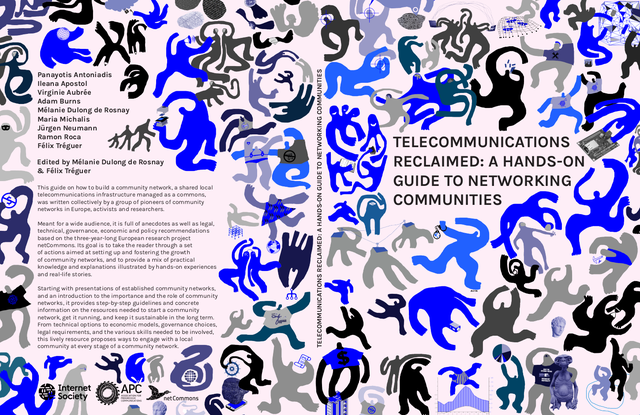
Sustainable Communities
Maslow's theory was influenced by First Nations philosophy. According to the First Nations,beyond the 7th layer lies the need for community actualisation. This was described in the 2014 book by Dr. Sidney Stone Brown, “Transformation Beyond Greed: Native Self-Actualization”.
There are plenty of instances where the ethics of those who are building "the Internet" resonate with the preservation and advancement of community values:
- A book: "Telecommunications Reclaimed: A Hands-on Guide to Networking Communities" (2018-2020)
- "practical knowledge illustrated by several hands-on experiences – a set of 32 real-life stories – as well as legal, technical, governance, economic and policy material extracted from netCommons, a three-year-long research project supported by the European Commission. Its goal is to guide the reader through a set of actions aimed at setting up and fostering the growth of a community network, but also, for policy makers, local administrations and the general public, to create the right conditions to let community networks bloom and flourish." (APC announcement)
- The story in IETF Journal about RFC 7962: “Alternative Network Deployments” (2016)
- “RFC 7962 presents the socioeconomic aspects of networking, thereby obtaining the attention of communities seeking to create and manage computer networks for the people by the people.”
- "Communities Renewable Energy Projects", by Centre for Alternative Technology, May 2021 (webinar recording)
- And the oldest (2005!) well-documented project I know of: "Wireless Networking in the Developing World", a free book about building low-cost wireless network infrastructure, with a website full of resources! WNDN.net
Beyond technical solutions, there are projects where community values are practised for their own benefit:
- Open Collective - Make your community sustainable. Collect and spend money transparently: https://opencollective.com/
- SPIRAL: Societal Progress Indicators for the Responsibility of All
- TOGETHER is an associative network of territories, collective actors and citizens acting in their place of life (territories, companies, etc.) to promote co-responsibility for the well-being of all now and for future generations.
- A platform for change makers: Communities for Future https://communitiesforfuture.org/
- “The world now faces another unprecedented challenge – the COVID-19 pandemic. Economies are grinding to a halt. Millions of people’s lives have been shattered seemingly overnight. Global capitalism is exposed like never before."
- "Historically, pandemics have forced humans to break with the past and imagine their world anew. This one is no different. It is a portal, a gateway between one world and the next." – Arundhati Roy
- "For decades ecovillagers, permaculture practitioners, and those in the Transition Network, have been imagining the world anew. More importantly, they have been experimenting with and demonstrating sustainable and regenerative ways of living.”
- European Day of Sustainable Communities takes place on 18 September 2021; it is a time to celebrate local communities taking action for a healthier, fairer, regenerative Europe
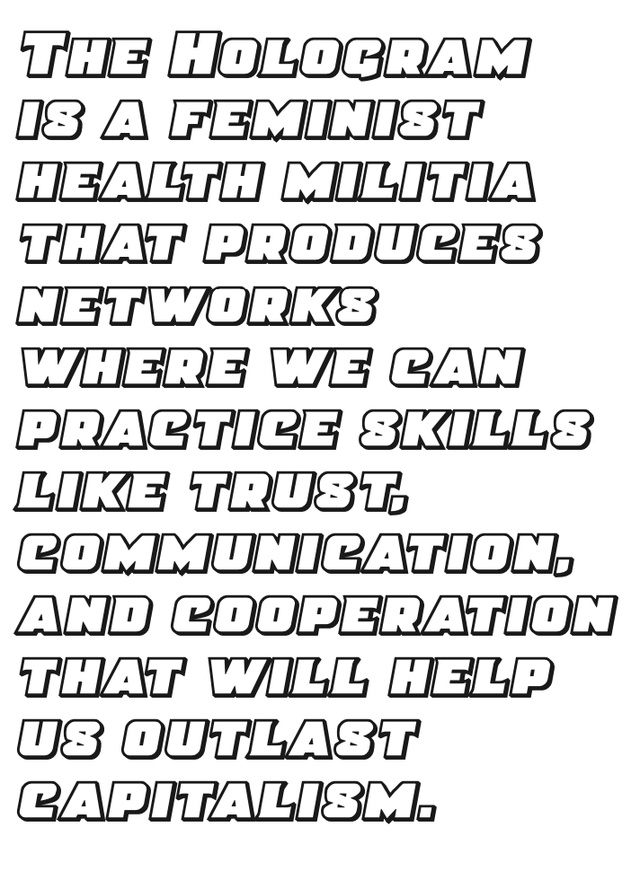
The Hologram
“Health is not an individual possession but a community responsibility.”
At the intersection of health, the capitalist economy, and community care, we find a feminist art project called “The Hologram”. Artist and activist Cassie Thornton worked collectively with psychologists, artists, organisers, and healers to come up with a practice “to give people an experience of social trust and interdependence”.
Visually, I see it as a tetrahedron - a triangular pyramid with four vertex corners.
Practically, “The Hologram” is a person who receives care from three helpers who are committed to one of the three aspects of her health: medical, emotional, and social. That way, “we can attend to and track the health of people around us through regular conversations (in person and virtual), close observation, and good documentation.”
Theoretically, it developed from the question, “where does the economy end, and where do I begin?”. "The Hologram" was presented at many exhibitions and conferences, such as:
- Syllabus: “An open-source, peer-to-peer, viral social technology for dehabituating humans from capitalism”
- Video: “CARING AS AN ACT OF RESISTANCE”, Radical eXchange 2020
- Exhibition: "An image of health in multi-dimensional crisis"
- Online Course for Developing Long-term Peer-to-Peer Health Strategies from within an Emergency
- Installation (2017): https://www.projectspace-efanyc.org/sick-time/
- PDF booklet
- Source: http://feministeconomicsdepartment.com/hologram/
Its further development depends on YOU and whether or not you choose to implement it within your community!

Upcoming Events
14 July, 10:00 (UTC): Open House: RIPE Community Resilience & WellBeing
10 July, 08:00 (UTC): SPIRAL, second quarterly online meeting
29 July: The Economics of Queerness
Further Resources on Alternatives to Capitalism
Movements
- Maternal Gift Economy Movement: https://www.maternalgifteconomymovement.org/
- De-growth
- Social solidarity economy:
- http://www.ripess.eu/ (RIPESS) RÉSEAU EUROPÉEN D’ÉCONOMIE SOCIALE ET SOLIDAIRE
- Circular Economy
- Extinction Rebellion: https://rebellion.global
Talks
- Carlota Perez:
- Rachel Botsman : "Collaborative Economy and The New Order of Trust" (2019)
- Guppy Bolla: decolonise the economy, repair our ecosystems and address wealth inequality (2021)
- World Circular Economy Forum + Climate (15-16 April 2021), https://www.wcefplusclimate.com
Critiques
- Gendered Economics, Kate Manne (in “Entitled”, 2020)
- Surveillance Capitalism, Shoshana Zouboff
- “'[P]atriarchalism' highlights the Marxist tradition’s problematic view of industrial production and the State in the struggle for human liberation."
- “Patriarchy of the Wage: Notes on Marx, Gender, and Feminism”, an upcoming book by Silvia Federici (November 2021)
- Stephanie McMillan: “Capitalism Must Die! A Basic Introduction to Capitalism: What It Is, Why It Sucks, and How to Crush It” (PDF)
- "IT industry is a dictatorship", Heather Marsh's blog post (2013)
- Rebecca McKinnon, "Consent of the Networked: The Worldwide Struggle for Internet Freedom" http://consentofthenetworked.com
- "Why I Am Not a Maker" by Debbie Chachra
- "When tech culture only celebrates creation, it risks ignoring those who teach, criticize, and take care of others."
- Algorithmic Governmenality by Antoinette Rouvroy
Articles
- Amsterdam is Embracing a Radical New Economic Theory to Help Save the Environment. Could It Also Replace Capitalism?
- The bear, the tiger, and the trade unionist by Julia Steinberger on Medium
- Here's why Indigenous economics is the key to saving nature by Krystyna Swiderska, 13 April 2021
- Economics Through the Lens of Women -- A Review of Giandomenica Becchio’s 'A History of Feminist and Gender Economics' by Ritwika Patgiri, 1 March 2021
- Jessica Green's "Can the World’s Bankers Really Save the Climate?"
- Degrowth and the emerging mosaic of alternatives, Corinna Burkhart, Nina Treu, Matthias Schmelzer, 9 June 2020
- Giving Up on Economic Growth could make us Cooler and Happier by Kate Aronoff, 13 May 2021
- The emotional labour of academia in the time of a pandemic: A feminist reflection by Michelle Newcomb, 4 March 2021
- Times of greed; times of fairness by Carlota Perez and Andres Schafer, 19 November 2020
- THE WOMEN OF RAQQA ARE REBUILDING THEIR FUTURE by Margherita Orsini, 30 May 2021
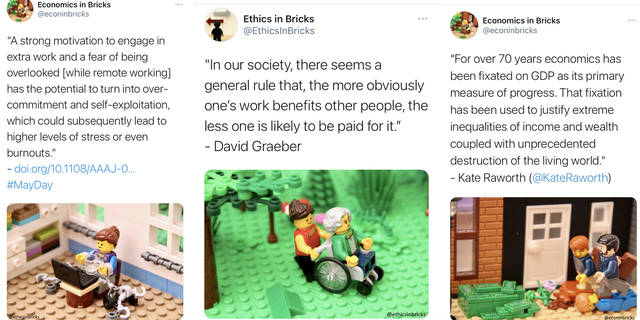
Bonus Links
- Why We Need Cooperatives for the Digital Economy & The Humansphere helps Perceive Abundance in the Anthropocene Era by Alexandre Lemille, 20 October 2020
- Degrowth: New Roots for the Economy
- Re-imagining the Future After the Corona Crisis
- degrowth, not efficiency by Georgios Kallis
- 16 answers to the question, "How can we create a successful economy without continuous economic growth?"
- Growth without economic growth, European Environment Agency, 2019
- The credit commons protocol, Matthew Slater (video)
- The Limits of the “Sustainable” Economy by Kieren Mayers, Tom Davis, and Luk N. Van Wassenhove, 16 June 2021
- Regarding Mutualism, Cooperativism, and Other (Interstitially) Anti-Capitalist Alternatives, by Russell Arben Fox, 14 June 2021
- Automating Ostrom for Effective DAO Management by Jeff Emmett on Medium
- These Alternative Economies Are Inspirations for a Sustainable World, Scientific American (link)
- What is the pay system you dream of? Beyond the taboo of money by Samantha Slade, 29 June 2017
- Economic Justice and Ecological Regeneration by Jeremy Lent, Spring 2020
- Degrowth and the pluriverse: Continued coloniality or intercultural revolution? - STEPS Centre
- TreeConomics: https://www.treeconomics.co.uk/
- Sizing up the green jobs revolution, Fabian Wallace-Stephens, 28 June 2021
- Economy we are creating, a book
- Less Is More, a book
- Reframing economics, by Herbert Girardet, 27 April 2021
- THE CASE FOR A SLOW ECONOMY, Andrew Simms, 29 June 2020 in Idler Magazine
- 2020: The Isolation Economy
- Techno-solutionism and the standard human in the making of the COVID-19 pandemic by Stefania Milan in Big Data & Society, 20 October 2020
- Transparent Salaries: Our New Remote-First Formula and Updated Salary Calculator (Caryn and Jenny, Buffer's Finance team), https://buffer.com/resources/salary-formula/
- David Graeber's essay from 2013, "A Practical Utopian's Guide to the Coming Collapse"




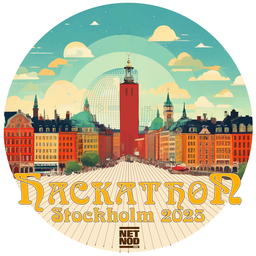
Comments 0
The comments section is closed for articles published more than a year ago. If you'd like to inform us of any issues, please contact us.